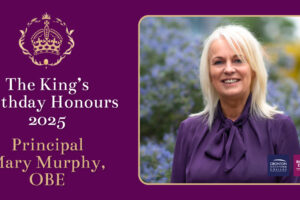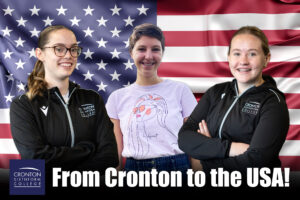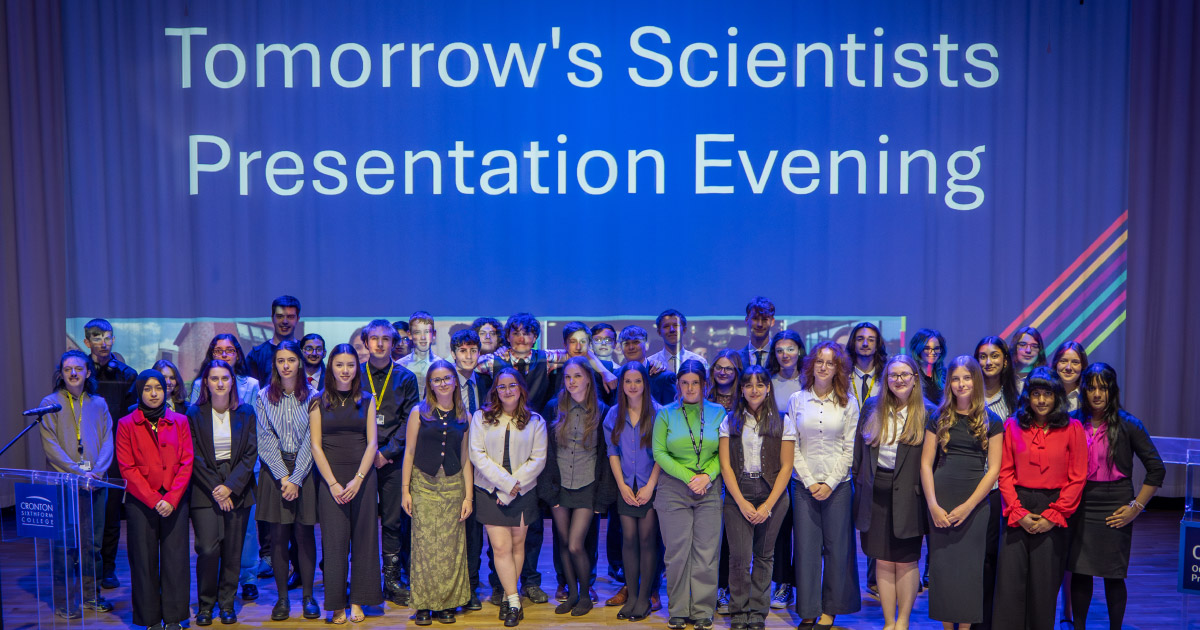
Future Scientists Unveil Year-End Research Projects
Gifted and talented students from the Tomorrow’s Scientists Programme at Cronton Sixth Form College recently took to the stage at the Cronton Playhouse, where they presented the findings of their independent research projects to an audience of teachers, friends, and family.
This marked the culmination of months of hard work and collaboration and formed a key part of their journey toward achieving a prestigious CREST Award, a nationally recognised accreditation for scientific research.
Throughout the year, the students worked in small teams to design and carry out their own super-curricular investigations. They developed their ideas, conducted experiments, analysed results, and prepared professional-style presentations. With support from staff and guest experts, they also gained valuable skills in teamwork, communication, and scientific thinking.
To help prepare for the final showcase, the 16 teams of students received presentation coaching from Matt Plant, Director of the Centre of Excellence for Performing Arts. For many, it was their first time speaking in front of a large audience and this gave them the confidence to share their work clearly and effectively.
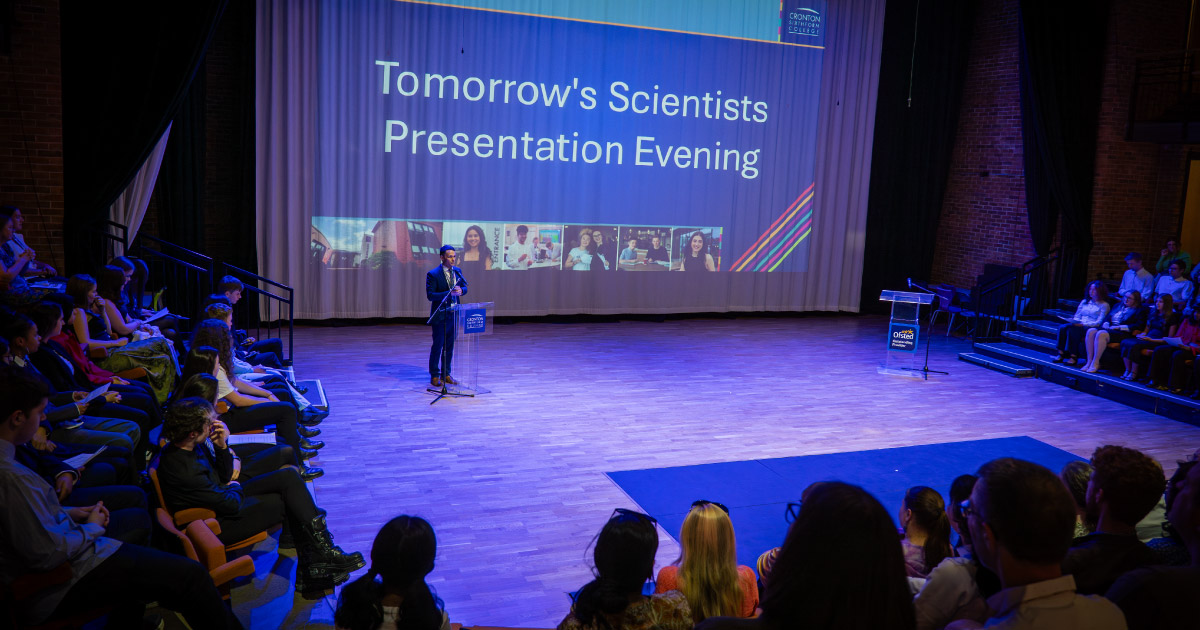
The team of Milly Elkington, Emily Jiang and Ben Turner chose to explore how we could visualise unseen patterns formed by sound using a Chladni plate, a device that reveals patterns formed by sound vibrations.
Milly, who is aspiring to study Chemical Engineering, found the physics-based research invaluable for their future studies. She said, “I learnt a lot about how to structure a science experiment. It has definitely prepared me for future tasks. I have been able to discuss the project on my UCAS application and will happily talk about it during an interview too.”
The team of Jakshana Prashanth, Jakshaha Prashanth and Anna Dabrowska investigated how essential oils are extracted using steam distillation and infusion. They tested their oils for scent and longevity, combining scientific precision with creative flair.
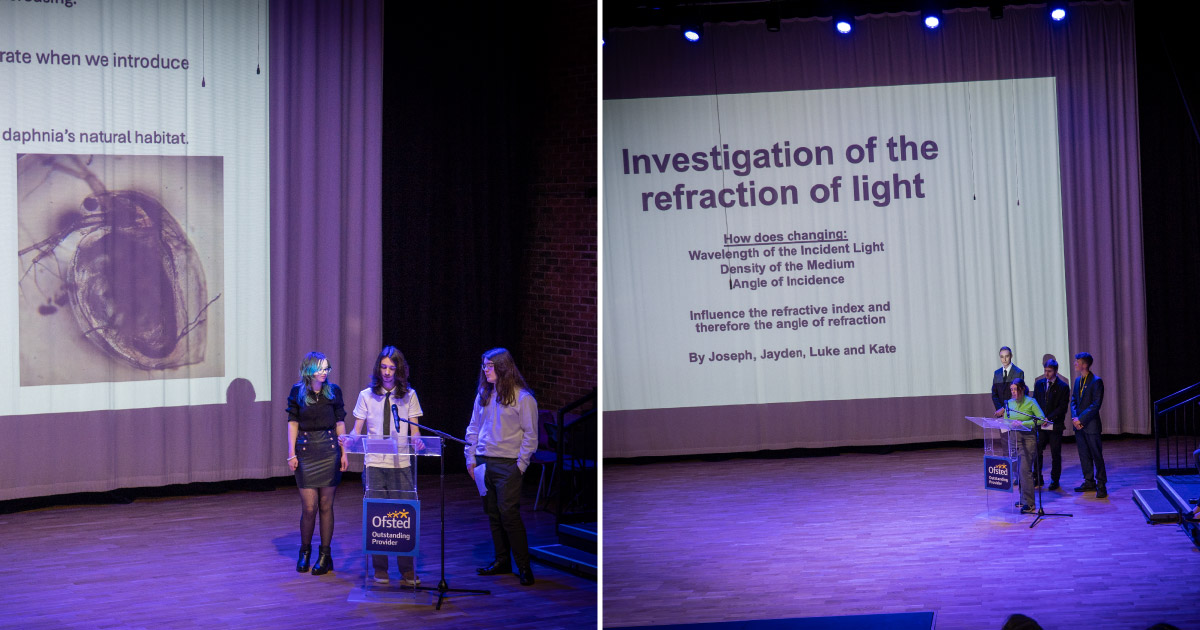
The students bonded over their shared interests, learned how to use scientific equipment, and developed skills in data collection, referencing, and public speaking.
Jakshaha said, “I feel more confident regarding presenting in front of a crowd for the future. Due to all these skills and experiences we have gained, we now have many assets we can mention in applications and UCAS personal statements.”
As the programme ends for the academic year, students provided some advice to those thinking of joining.
“If you have an interest in science and want to develop your research skills, perseverance, team building, teamwork and presentation skills. then you would greatly benefit from Tomorrow’s Scientists.” – Jakshana Prashanth
“If deeply fascinated by sciences, or if you are considering a career in STEM, the Tomorrow’s Scientists Programme will be a very useful experience.” – Jakshaha Prashanth
“I would recommend Tomorrow’s Scientists to new students because I was able to meet new people and make connections, improving my social skills, as well as develop my scientific and practical knowledge of a topic I thoroughly enjoyed.” – Anna Dabrowska

The Tomorrow’s Scientists Programme is a launchpad where young minds are encouraged to ask questions, explore ideas, and take their first steps toward a future in science.
Students who sign up to complete the Tomorrow’s Scientists Programme can also receive tutoring for the University Clinical Aptitude Test (UCAT), take part in prestigious work experience placements and attend guest lectures and masterclasses from professionals working in science-based industries. Students who are interested in a career in medicine can also take part in the Tomorrow’s Medical Professionals.
Learn more about the Professional Studies Programmes at Cronton Sixth Form here: www.cronton.ac.uk/professional-studies
Project Title | Group Members
-
Investigating cross contamination of bacteria across surfaces
Erin Sweeney, Sarah Tanuska and Lillian Reeves -
Factors that affect the speed of a boat
Gustavs Bovkuns, Kris Pickavance, Connor Rowlinson, Rachael Howarth -
Investigating the Fragrances of Perfumes
Anna Dabrowska, Jakshana Prashanth, Jakshaha Prashanth -
Effects of various materials on the frequency of longitudinal waves
Aidan Lamb, Theron Jackson -
Impact of water contaminants on waterborne life
Albert Manzu, Isabella Rutter, Ethan Doyle -
How Chladni plates can allow us to visualise sound
Milly Elkington, Emily Jiang -
The impact of common beverages on tooth enamel
Tom Ryan, Fin Gibbons -
Is static electricity more sustainable than mains electricity?
Chloe Doran and Elayna Currey -
Effect of increasing ethanol concentration on the heart
Hanna Ahmed, Liam Holmes -
Investigating the affect of different frequencies of light on the heart rate of daphnia
Holly Gilfoyle, Tasha Soden-Barton -
The Refraction of light
Joseph Sweeney, Jayden Rigby, Luke Mansley, Kate Hagen-McBride -
Creating a more accessible treatment for acid reflux
Hosna Noory, Macy Gibson, Orlagh Cahoon -
Which of the 5 senses do rats rely on the most?
Nancy Coyle, Anna Piccinetti, Grace McClelland -
Investigating the effectiveness of different fabrics in blocking UV light
Lewis James, Ashwin Sharma, Taha Ali -
Does frequency affect the growth of plants?
Diego Ferrero Cerezo, Ruben Ferrero Cerezo, Nathan Gill, Rowan Wood -
Welfare & Ethics of dog breeding
Ryan Cross

